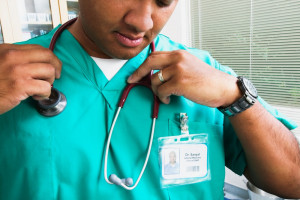
People in Louisiana communities that experience cancer health disparities could be interested in participating in clinical trials or submitting samples to biobanks if provided information about these opportunities by a trusted physician, but physicians reported lacking appropriate information to give to their constituents, according to data presented during a media preview for the AACR Annual Meeting 2018, April 14-18, in Chicago, Illinois.
“Adults from communities that experience cancer health disparities, such as racial and ethnic minority groups, those with low socioeconomic status, and those who live in rural areas, are underrepresented in clinical trials and biobanks,” said Terry C. Davis, PhD,professor of Medicine and Paediatrics at Louisiana State University Health Sciences Center in Shreveport and at the Feist-Weiller Cancer Center,and director of the Health Literacy Core of the Louisiana Clinical & Translational Science Center. “This issue must be addressed if we are to ensure that new treatments are available and effective for all patients in all segments of the population.”
To learn more about why disparities exist in participation in clinical trials and biobanking, Davis and colleagues conducted focus groups and interviews with adults from racial and ethnic minority groups, those with low socioeconomic status, and those who live in rural areas and the health care providers that serve them.
“By talking to adults from populations that are underrepresented in clinical trials, we found that they are open to participating in clinical trials and biobanking, even if it will not benefit them directly, but that they had never been asked to participate and did not know where to learn about participation,” said Davis. “They all agreed that information would be most effective and actionable if given to them by a trusted physician, but when we talked to health care providers in their community, they said that they lacked information to discuss with their patients.“
Our results show that participation of populations underrepresented in clinical trials and biobanking could be enhanced by developing working relationships with community clinics because community providers are the conduit to patient participation,” added Davis. “Structured methods for delivering useful, plain language information on clinical trials and biobanking need to be created collaboratively with community clinics and the public.”
Davis and her colleague Connie L. Arnold, PhD, held 14 focus groups and seven individual interviews from January 2017 to May 2017 in urban and rural communities in Louisiana.
Among the 78 patient and community participants, 78 percent were African-American, 24 percent lived in rural communities, and 70 percent reported having lower income.
Among the 25 safety-net health care providers who participated, 10 were physicians, seven clinical research associates, five nurse practitioners, and three behavioural health professionals.
Overall, almost all of the patient and community participants stated that they were open to participating in clinical trials and biobanking.
Only the two cancer center patients had been asked to participate by their physician.
None of the participants had looked for clinical trials on the internet or social media.
Information on clinical trials and biobanking would be most effective coming from a trusted health care provider, according to the patient and community participants.
No-one suggested the internet would be a useful place to put information.
All the health care providers were interested in learning more about clinical trials and biobanking and wanted closer ties with researchers.
The primary care physicians thought that brief, plain language handouts with talking points to discuss and share with patients, together with contact information of a person to call to get more information about participation in a trial or biobanking, would be effective ways to increase participation.
“These results highlight a huge communication gap between the cancer research community and potential participants in cancer genomics studies as well as their providers,” said Davis.
“Enhancing communication is a key priority moving forward. Since a trusted provider is essential for enrollment, these trusted providers and their patients need to have access to clear, culturally appropriate, unbiased information on genomics trials, and their potential risks and benefits. This should happen before anyone is asked to participate in a particular study, not during the consent process.”
According to Davis, a main limitation of the study is that this is a pilot study with a limited number of participants in one state.
To strengthen the conclusions of the study, the researchers would need to speak with more people from an even more diverse set of communities, such as additional rural areas and those in Hispanic and non-English speaking communities, she said.
Source: AACR
The World Cancer Declaration recognises that to make major reductions in premature deaths, innovative education and training opportunities for healthcare workers in all disciplines of cancer control need to improve significantly.
ecancer plays a critical part in improving access to education for medical professionals.
Every day we help doctors, nurses, patients and their advocates to further their knowledge and improve the quality of care. Please make a donation to support our ongoing work.
Thank you for your support.